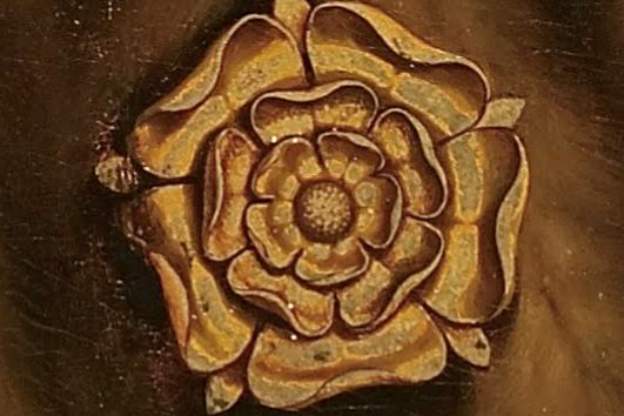
Following long and bloody disputes, the Wars of the Roses came to an end. Lancaster and York were united through the marriage of Henry VII to his third cousin Elizabeth. The two were wed in January 1486 at Westminster Abbey. The joining of England's two noble houses was celebrated with the Tudor Rose, an emblem of red and white. The rose stood as a lasting symbol of the Tudor Dynasty, particularly during the reign of Henry VIII.
That same month, Martin Agricola was born. The German composer and music theorist wrote studies of musical rudiments aimed at performing musicians. He also wrote extensively on the subject of organology, the study of instruments. In 1529, Martin published his Musica instrumentalis deudsch. The treatise contains a collection of detailed woodcuts depicting instruments used in his age. Many of the woodcuts offer insight into the formation of the renaissance consort.
In September 1486, German scholar Heinrich Cornelius Agrippa von Nettesheim was born. Throughout life, Agrippa cultivated a fascination with the occult sciences. Resultant suspicion suspended his work on several occult tracts and made him a figure of great notoriety. Following his death in 1535, dark rumors spread. Many believed that, before death, Agrippa summoned a familiar and sent it out into the world. Indeed, that familiar—a black dog—appears in subsequent legends about Faustus, including that by Goethe.
In December 1486, Italian philosopher Giovanni Pico della Mirandola published his De hominis dignitate, or “Oration on the Dignity of Man.” The Oration was meant to preface 900 theses on mankind's quest for universal knowledge. These theses evoked tenets of Greek, Hebrew, and Christian philosophy, weaving discordant schools of thought into a cohesive whole. Pico welcomed fellow scholars to Rome to debate his arguments; however, the progress of Pico's plan was soon impeded by Pope Innocent VII. The Pope called for a review of the theses and had thirteen of them condemned. The remainder were deemed incendiary and offensive to all pious Christians.









